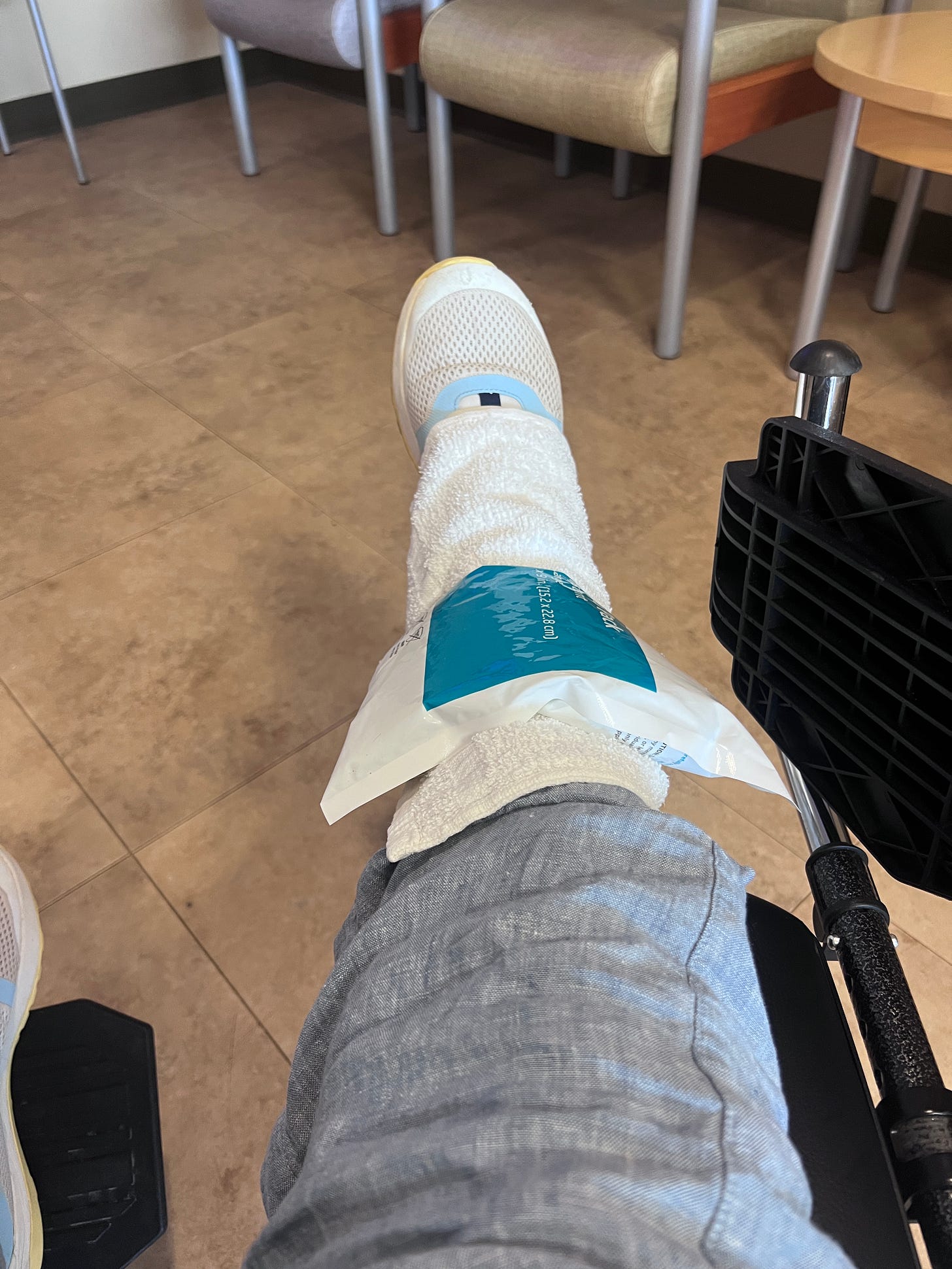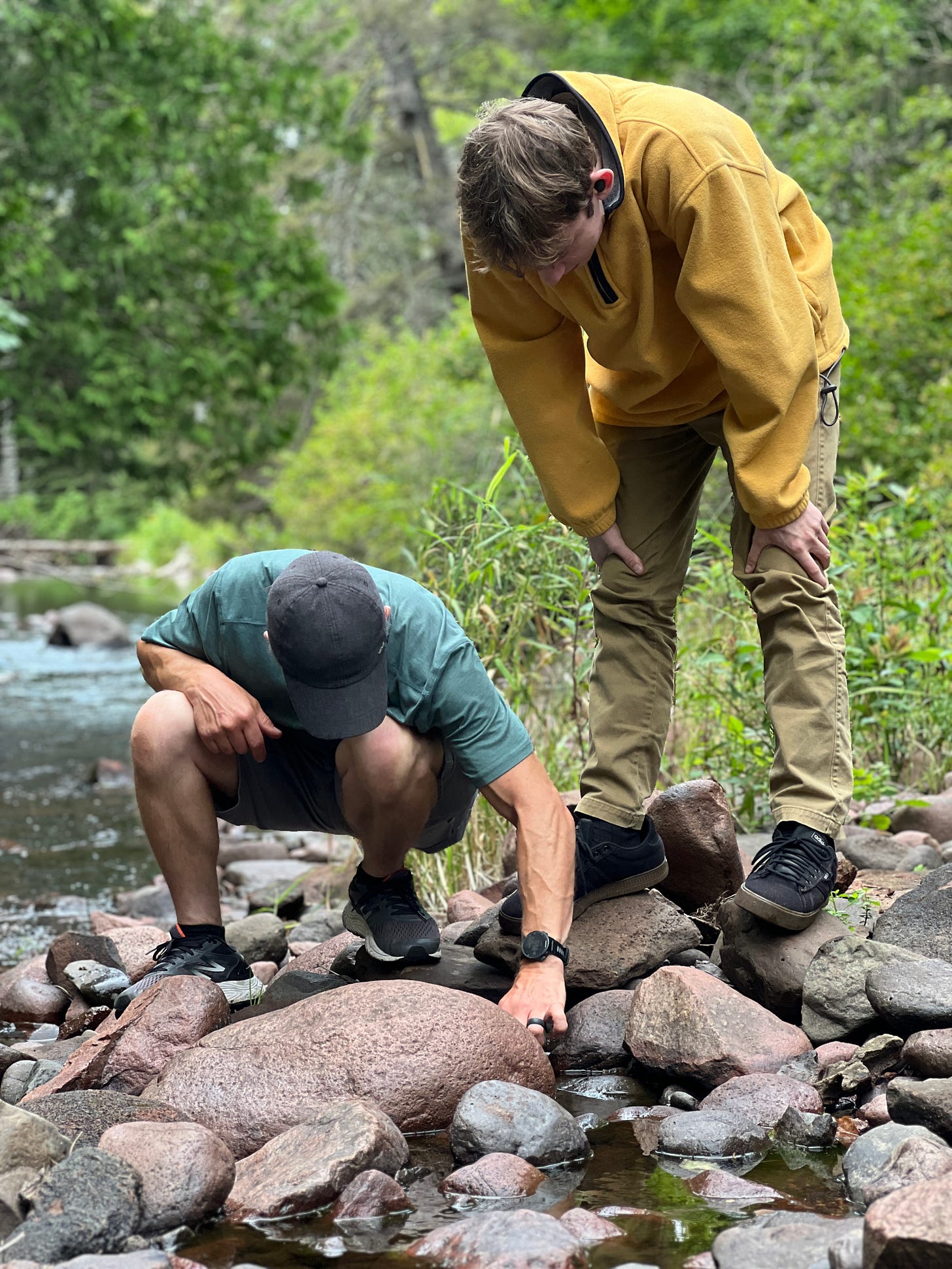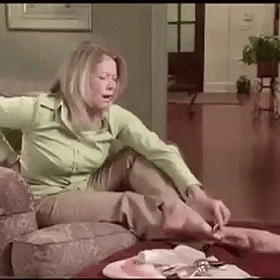Being a good steward - of myself
Caring for my mother's heart and midlife body requires "careful and responsible management"
Last Saturday afternoon, we dropped my second-youngest child Owen off at college.
I told Owen, as we pulled up to the university on drop-off day, that I thought I might be more excited than him. I couldn’t wait to check out campus, help him get his dorm set up, meet his roommate. It felt like living my own college move-in day all over again.
And maybe, just maybe, leaning into all the fun and excitement was helping to distract me from the sad reality that our home life, with just one child left at home, is going to look and feel very different now.
When Owen’s roommate arrived, Eric and I decided to leave the two of them to get to know each other and started walking downtown…when I tripped on a patch of uneven blacktop, rolled my ankle, and went sprawling.
I knew on the way down that it was bad. If you had been within groaning distance you’d have heard the “Oh no, oh no, oh no” I was already sobbing out mid-fall, accented by a plaintive F-bomb as both knees collided with the ground, my foot twisted under my body’s full weight.
A moment after I fell Eric took one look at my ankle, already bruised and goose-egg swollen, and started asking bystanders for help getting us back to our car about a mile and a half away on the other side of campus.
And so instead of spending the evening at Michigan Tech’s welcome night, we spent it in the emergency room.
After my X-ray, the doctor informed us that my (by now elephant-esque) ankle was merely badly sprained, and not shattered in a dozen places like I’d been halfway expecting to hear.
But the news also came with this decree: 10 days on crutches, 10 additional days in a splint, and at least 3-4 months before I could expect total recovery.
As if turning my ankle and falling on my face in front of multiple strangers (several of whom so kindly came to our aid!) wasn’t bad enough, as the evening went on and the adrenaline wore off, all the things I’d likely be missing sank in: the rest of Owen’s moving-in weekend festivities including a chance to see his dorm room all set up, hikes and exploring in the Keweenaw Peninsula, and several more days playing in the U.P. and working in our store.
Instead, I got to give my youngest son an awkward and hasty hug from my perch, stretched across the backseat of the car with my foot propped up, as Eric and I left Houghton Sunday morning.
I cried bitterly as he walked so casually away toward his new life. Perhaps, as mothers sometimes tend to, I was overestimating my importance in this new stage of his life just a wee bit. But it felt so unfair, after all the planning and excitement and preparation and anticipation, that he’d start school with such an anticlimactic send-off.
And instead of long walks along the boardwalk and happy hours puttering in my shop, I’ve spent most of the last few days in bed with my foot elevated, learning to get around on crutches, and being waited on by my (mostly patient but occasionally perplexed) husband, who perhaps doesn’t fully understand why I’ve been a bit more emotional than usual.
The word “stewardship” seems to come up a lot in three sometimes-overlapping, but mostly-separate spheres I pay attention to: farming/homesteading, environmentalism/conservation, and Christianity. It makes sense: all of these practices are (at least ideally) guided by the idea that human beings are obligated to, as the Merriam-Webster definition states, “the careful and responsible management of something entrusted to [our] care.”
When I think about the things “entrusted to my care” - my family, my animals, my food, my stuff - of course I want to handle them all with “careful and responsible management.” But too often, I allow the “ain’t nobody got time for that” narrative to seep in. Too often, I find myself squeezing in too many things to steward, then only having scraps of time and energy to give each.
So I’ve been thinking about ways I can approach my life with more of a sense of careful stewardship. And the more I think about it, the more I realize there’s no realm in which the concept of “stewardship” is off limits. From my home and car to my friendships, kids, and marriage, there are countless opportunities to practice good stewardship, even in small ways.
When I started writing this post, the day before I took the tumble that landed me on crutches, I had planned on highlighting some ways I could practice better stewardship in different areas of my life: food, garden, even laundry. And over the next few months I plan to return to the topic of stewardship again, detailing how I am attempting to apply the idea of being a careful and responsible manager to many different areas of my life.
But for today, I want to focus on something I don’t think gets as much attention as it should, and that is: being a careful steward of ourselves.
The privilege of paying attention to my body
The first time I experienced vertigo, I had just turned 40 and was on a camping trip in Michigan. I woke up in the middle of the night to use the bathroom, and when I rolled over to unzip my sleeping bag, the tent seemed to roll with me…and kept rolling.
Following the doctor’s instructions are a no-brainer right now, since putting any weight on my right foot is out of the question. But those instructions could easily be a lot harder to stick to in a week or so, after the most dramatic pain and swelling has (hopefully) subsided. I’ll be tempted to go back to business as usual, to hurry back to the freedom and mobility I’m used to. Perhaps even to add on more activity than is normal in order to distract me from the emotional reality of sending yet another child out into the world.
How will I act as a responsible and careful steward of myself when the “ain’t nobody got time for that” narrative, plus our cultural obsession with productivity, plus my natural inclination to stay busy and on the move all conspire to tempt me to defy both my doctor’s orders and my own need to really process the enormous changes happening in my life?
Here’s what I’m pondering right now: stewardship doesn’t always feel fun or easy. Staying off my feet for weeks at a time is, frankly, going to suck. It doesn’t feel at all like the spontaneous, YOLO-style way I like to live my life, and it means missing end-of-summer fun. It’s going to mean slowing down, being less productive, asking for more help.
None of these things come naturally to me, yet they’re all necessary if I want to heal properly. Bodily, yes…and perhaps also, in this time of transition, my heart and soul.
Midlife injuries happen. So does healing.
One day in early November, I woke up with pain radiating up the inside of my left calf. A day later, the top of my left foot felt tender to the touch. And a day after that, the whole thing swelled up, from the spot where my foot meets my toes to the flesh around my ankle bone.
There’s a kind of rightness, I think, to kicking off a series on stewardship with the reminder that it doesn’t only apply to things and people besides myself. One of my first and most important jobs is caring for myself: even when it’s hard, even when it’s boring, even when I think I ain’t got time for that.
As I age more deeply into midlife and beyond, I sense that this is a lesson I’m going to be forced to learn again and again.
For now, I’m trying to muster up the patience to lean into this time of self-care. More rest, less productivity. Less independence and mobility, more reliance and rootedness. Taking the time to move slowly and feel deeply. Stewarding myself with the sort of care I might otherwise not have bothered with.
Remembering that, actually, I absolutely do have time for that.










The sounds terrible, Meagan. I know how hard it is to stay still and I’m sorry you had to miss the rest of the festivities. I appreciate your meditations on stewardship and taking care of oneself.
Oh no, I'm so sorry to hear about your fall. I wish you a smooth recovery.
Additionally, I love what you're talking about here. I've been thinking a lot lately about what I've been calling REAL self-care—the kind that nourishes and supports you. And one thing I've found in my own life is that REAL self-care is preventative. The more time I can give to myself before the you-know-what hits the fan, the better I am for it.
I was just listening to a podcast in which someone discussed how boredom is a doorway to creativity. Perhaps during this time, you'll find some creative silver linings. <3